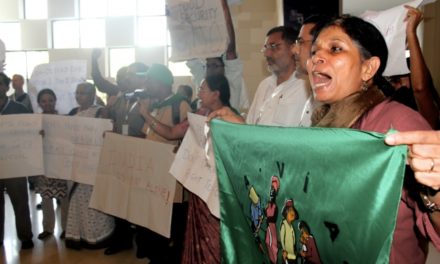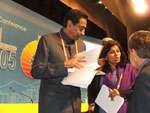In the past months, commentators and politicians have started grumbling about non- government organisations and their apparent influence on the trade debate.
The UK international development secretary Clare Short’s concern that "those who normally stand up for the needs of the world’s poor are … working against the interests of developing countries," (Financial Times, 4 November) is just another voice in the growing establishment chorus all singing the same tune. The refrain goes like this: the future of free trade is threatened by noisy, undemocratic and ill-informed non-government organisations and this will hurt the Third World.
Financial Times columnist Martin Wolf in his article ‘Uncivil Society’ (1 September) declared that "the claims of NGOs to represent civil society as a whole and, as such, to possess legitimacy rivalling — perhaps even exceeding — that of elected governments is outrageous." He warned that policy-makers need to "prepare their ground" to resist the "enemies of the liberal international economy" who have found "new arguments and new ways of organising."
Two days later, newly appointed WTO head Mike Moore echoed these views in an interview with this newspaper. Moore, characterised by the media as a straight-talking trade unionist and social worker, sees himself of the side of the ‘battlers.’ This, however, did not stop him from attacking the critics of the WTO, saying "The people who march in Seattle will be marching against opportunities for poor countries to sell their products and services."
"It does irritate us," he said, "that someone who never sells a product, never gets a vote and doesn’t actually do anything can come out and attack you." (Only a bad sport would point out the that Moore wasn’t elected to his job either.)
Across the Atlantic, Marcus Noland, a fellow of the Institute for International Economics, warned against the increasing influence of non-government organisations in the latest issue of Foreign Policy. He despairs that US trade policy is driven by political considerations, and makes a pragmatic argument in favour of finding space within the WTO agenda to accommodate "special-interest groups" if only to prevent them "capturing trade policy for their own ends."
And last week ago, Jeffrey E. Garten, former undersecretary for commerce in Clinton’s first administration, wrote in Business Week (8 November) that "if Washington and corporate America don’t move decisively, NGOs could dominate public opinion on global trade and finance."
But just 18 months ago US President Bill Clinton told trade ministers in Geneva that "we must modernise the WTO by opening its doors to the scrutiny and participation of the public." He also urged the WTO to "provide every opportunity for stakeholders to convey their views," sentiments echoed by US Trade Representative Charlene Barshefsky and the then-WTO Director General Renato Ruggiero.
At that time, the push for greater civil society engagement with the WTO was motivated by several concerns.
First, failure of the OECD’s Multilateral Agreement on Investment and the US Congress’ vote against presidential ‘fast-track’ authority were signs of growing NGO power. The WTO itself was being challenged and it was hoped that bringing NGOs into the fold would quieten some of the noisier voices, and split off the rest. Second, NGOs can be quite useful to governments – to confer legitimacy, to gauge public opinion, to test the limits of policy, and even sometimes to point out stupidity, corruption and brutality. But what really worried the world’s leaders at last year’s meeting was that the benefits of free trade – and globalisation more generally – were being questioned (even by some in the G7) following the Asian and Russian financial crises. The task of re-building public support for globalisation was vital and NGOs needed to be accommodated.
But everywhere public confidence in globalisation and the institutions who manage it – the WTO, the International Monetary Fund and the World Bank – continues to slip, and the establishment is worried.
The attacks on NGOs have not come out of thin air. Proponents of free trade realise that – for the first time – trade has become a matter of public concern and they fear the impact NGOs are having on the debate and their reaction is to discredit both the legitimacy and the arguments of this extraordinarily diverse group of activists.
NGOs themselves are a response to economic liberalisation. For the past twenty years, there has been a systematic effort to reduce the role and size of governments, to privatise public goods and services, and to open up trade and finance to the global market. On one side, this has reduced the power and the willingness of governments – which are almost universally dominated by the elites — to deal with the negative effects of economic liberalisation, such as unemployment, environmental degradation, falling commodity prices and declining terms of trade for the Third World. At the same time, traditional and essentially conservative organisations such as trade unions did not respond to a wider constituency such as women workers, Third World workers and the unemployed.
Nationally and internationally, governments and institutions failed to deal with pressing concerns of human rights, food security and environmental degradation and it is in this context that non- government organisations have taken up the fight. They are not plotting to undermine democracy, or even ‘represent’ civil society, but trying to highlight and close the huge gulfs in political and economic democracy that exist both within and between countries.
NGOs do not speak with one voice but there is a tremendous degree of unanimity in the trade campaign. More than 1,000 organisations from some eighty countries (many of them Third World countries) have signed on to a two-page statement demanding a moratorium on any new issues or further negotiations, during which there should be a comprehensive review of the impact of existing agreements. Given that the benefits of free trade – even for the Third World — are not clear-cut this is a reasonable demand.
Pre-Seattle negotiations in Geneva are getting bogged down – with a huge number of issues either unresolved or contested. Between now and the end of November, NGOs will be played off against each other, and their legitimacy will be questioned, not least by the ‘democratic’ West. NGOs from many developing countries are used to standing up to authoritarian governments, and will probably survive the rigours of this cut-throat diplomacy. But things could get pretty tough in Seattle, and there is no doubt that the governments will try to divide and conquer the NGOs for their own ends.
The superpowers are preparing themselves for failure – or at least limited success — in Seattle. And if this happens, it won’t be the WTO that gets the blame, because the scapegoats already have a name: ‘uncivil society.’
* Nicola Bullard is deputy director of Focus on the Global South, a policy research and advocacy organisation based in Bangkok.





![[IN PHOTOS] In Defense of Human Rights and Dignity Movement (iDEFEND) Mobilization on the fourth State of the Nation Address (SONA) of Ferdinand Marcos, Jr.](https://focusweb.org/wp-content/uploads/2025/07/1-150x150.jpg)



